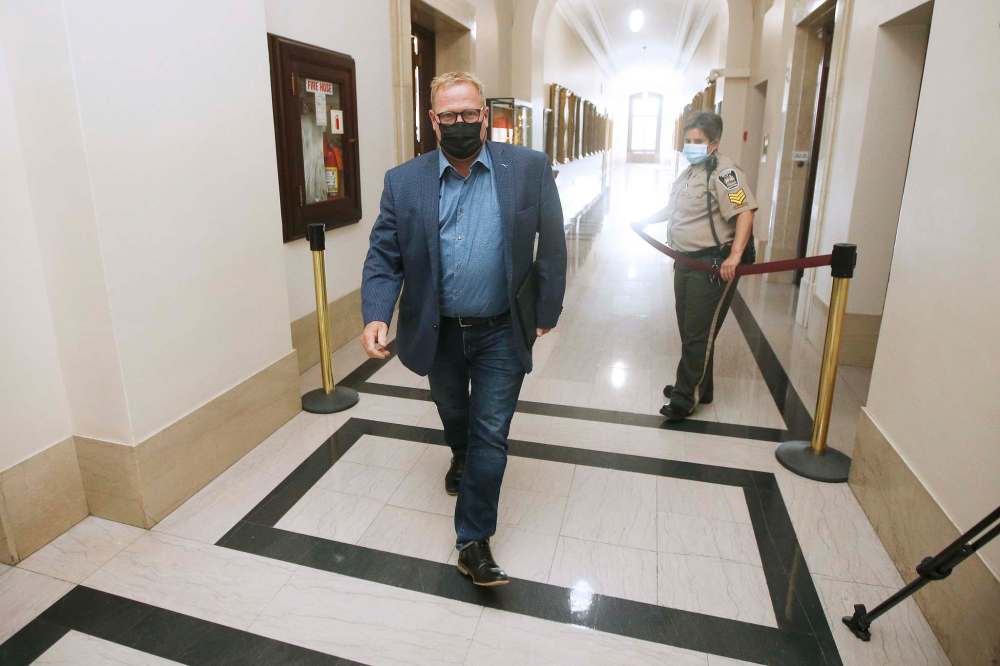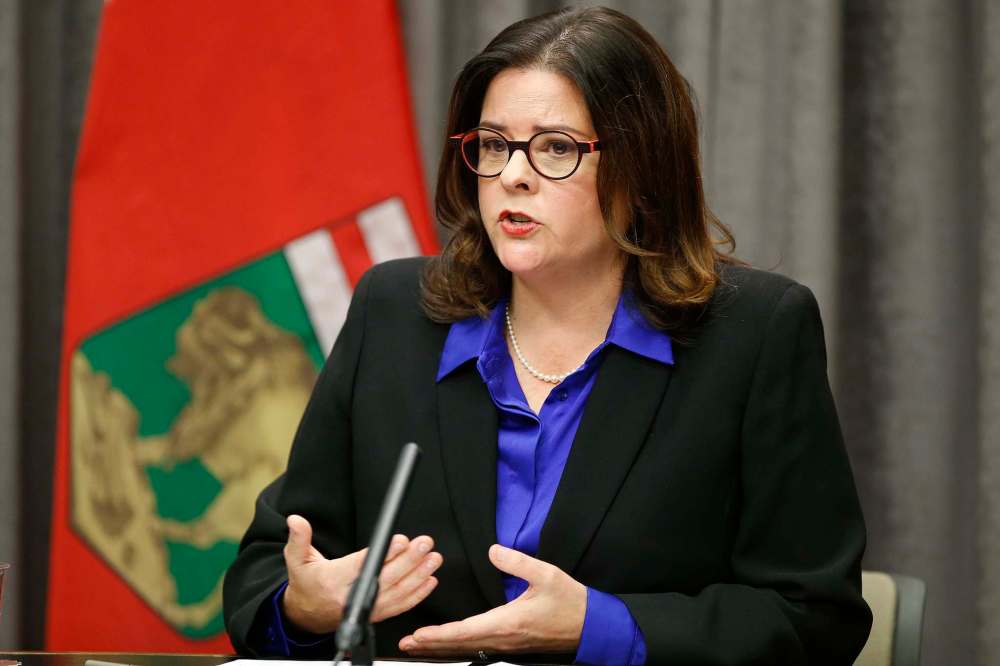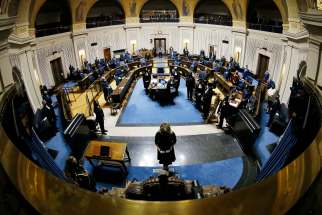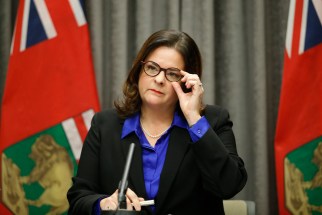Tories have to put money behind promise to repair labour relations
Read this article for free:
or
Already have an account? Log in here »
To continue reading, please subscribe:
Monthly Digital Subscription
$0 for the first 4 weeks*
- Enjoy unlimited reading on winnipegfreepress.com
- Read the E-Edition, our digital replica newspaper
- Access News Break, our award-winning app
- Play interactive puzzles
*No charge for 4 weeks then price increases to the regular rate of $19.00 plus GST every four weeks. Offer available to new and qualified returning subscribers only. Cancel any time.
Monthly Digital Subscription
$4.75/week*
- Enjoy unlimited reading on winnipegfreepress.com
- Read the E-Edition, our digital replica newspaper
- Access News Break, our award-winning app
- Play interactive puzzles
*Billed as $19 plus GST every four weeks. Cancel any time.
To continue reading, please subscribe:
Add Free Press access to your Brandon Sun subscription for only an additional
$1 for the first 4 weeks*
*Your next subscription payment will increase by $1.00 and you will be charged $16.99 plus GST for four weeks. After four weeks, your payment will increase to $23.99 plus GST every four weeks.
Read unlimited articles for free today:
or
Already have an account? Log in here »
Hey there, time traveller!
This article was published 24/11/2021 (1478 days ago), so information in it may no longer be current.
Ding-dong, the wicked old Public Service Sustainability Act is dead.
In a surprise move that was not referenced in Tuesday’s throne speech, Manitoba’s Progressive Conservative government issued a news release at just after 6 a.m. Wednesday to announce it will repeal the act, otherwise known as the public-sector wage-freeze legislation.
It was passed in 2017 but never proclaimed into law. Even so, it was imposed on contract talks between the government and government-funded entities and public-sector unions until 2020, when a coalition of unions took the PC government to court arguing the act was unconstitutional. A lower court agreed and called the proposed law “draconian,” but that decision was overturned on appeal in mid-October.
Labour unions announced their intention to seek leave to appeal that decision to the Supreme Court of Canada.

In its news release Wednesday, Finance Minister Scott Fielding said the decision to repeal the act signalled a “fresh start” in the dialogue with public-sector unions. Fielding said the pandemic has deepened the economic burdens on the province and that the government was committed to avoiding layoffs while providing financial relief for “all Manitobans.”
It’s not clear that repealing the act will wipe the slate clean between the Tories and unionized public-sector workers. For the time being, however, Fielding would like unions to view this decision as proof that newly minted Premier Heather Stefanson wants to shed the cantankerous labour relations that accompanied former premier Brian Pallister’s five years in office.
That’s a big request, and it’s not clear unions are willing to buy in.
In response to Fielding’s surprise announcement, Manitoba Federation of Labour president Kevin Rebeck, said the Partnership to Defend Public Services “welcomes” the repeal of the act but will proceed to seek leave to appeal to the Supreme Court.
Rebeck said the best way the government can prove it is sincere is to not formally oppose the leave-to-appeal application.
“If the Stefanson government is serious about wanting to reset the relationship with workers and unions, we call on them to stop interfering in public-sector bargaining, and to make a clear and genuine commitment that the government will also not oppose our application to have the Supreme Court consider the constitutionality of wage-freeze legislation,” Rebeck stated in the release.

His comments are intriguing because they introduce another element: the current faculty strike at the University of Manitoba.
Faculty association members walked off the job in early November after they were unable to reach a wage deal. Complicating matters was an assertion by the union that the government had, once again, directed the university to limit its wage offer. That is what happened in 2016 when the university was secretly directed by the Tories to withdraw a multi-year contract offer and replace it with a one-year wage freeze.
The same appeal court decision that declared the wage-freeze act constitutional also found that the government had improperly meddled in contract talks between the university and faculty association. As a result, the faculty association is seeking $28.8 million in damages.
Can the repeal of the wage-freeze act resolve the multiple skirmishes the Stefanson government is waging with public-sector unions? Perhaps, but only if this government starts walking the talk.
From the moment he took over in 2016, Pallister made it clear he did not want to negotiate with unions. He got rid of several committees that allowed labour and business to make recommendations to the premier’s office, and replaced them with business advisory groups. He stopped meeting in person with labour leaders.
Then there was the wage-freeze legislation. With no pressing fiscal crisis, Pallister nonetheless tried to impose a wage freeze, and three years of extremely modest wage increases, across all government contract negotiations. Even without proclaiming the act, government negotiators made its terms the one and only offer to unionized workers.
Several dozen unions did settle under the terms of the wage-freeze act. Many others did not and many of those — including nurses, school teachers and others — are now getting retroactive settlements that go well beyond the austere terms of the act.

Add it up, and you can see why repealing the act does not necessarily, on its own, rebuild trust between the Stefanson government and public-sector unions. In fact, it’s not clear that Stefanson can pull off that trick before the next provincial election.
Notwithstanding the inexplicable decision by the Manitoba Court of Appeal to uphold the act, it stands as one of the clumsiest and most arrogant tools ever wielded by a premier in this province. It crippled collective bargaining for nearly five years, and left taxpayers on the hook for years of retroactive wage increases.
Getting rid of a law that should not have been created in the first place is a good first step. But it doesn’t, on its own, repair this government’s tattered relationship with its unionized workers.
Workers who will, no doubt, be active in the next election.
dan.lett@freepress.mb.ca

Born and raised in and around Toronto, Dan Lett came to Winnipeg in 1986, less than a year out of journalism school with a lifelong dream to be a newspaper reporter.
Our newsroom depends on a growing audience of readers to power our journalism. If you are not a paid reader, please consider becoming a subscriber.
Our newsroom depends on its audience of readers to power our journalism. Thank you for your support.
History
Updated on Wednesday, November 24, 2021 9:40 PM CST: Fixes typo.







